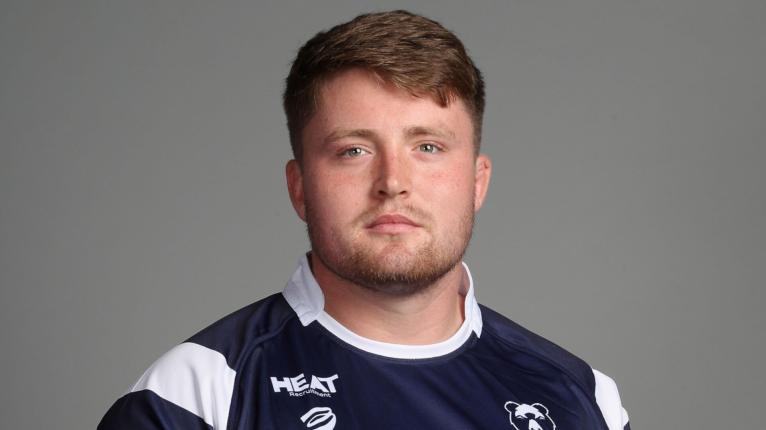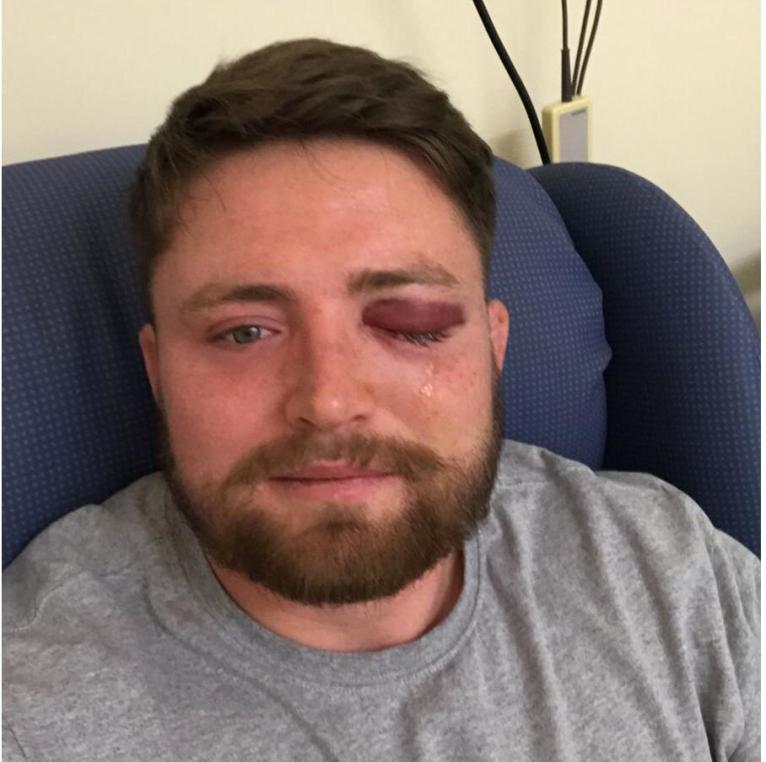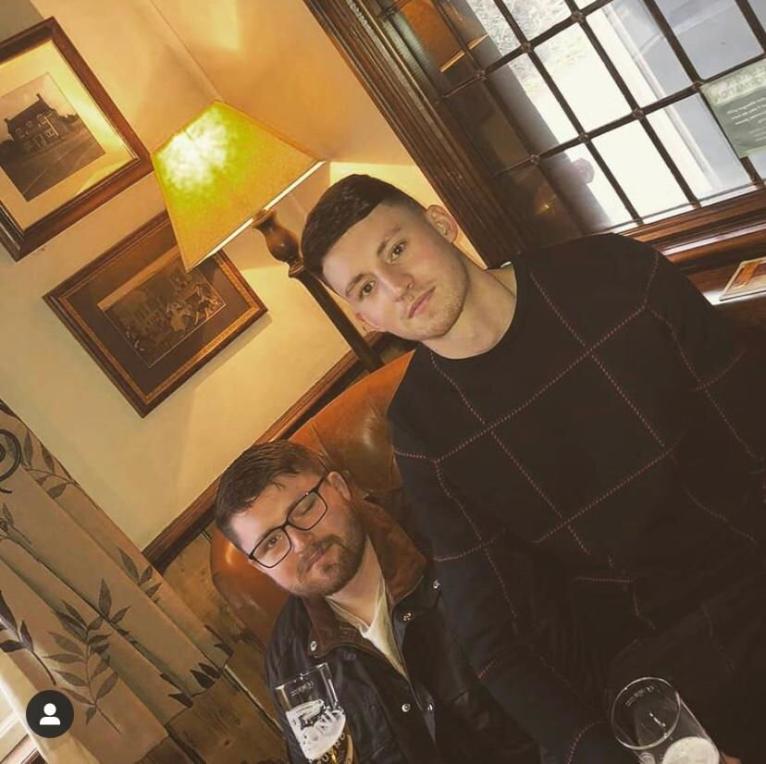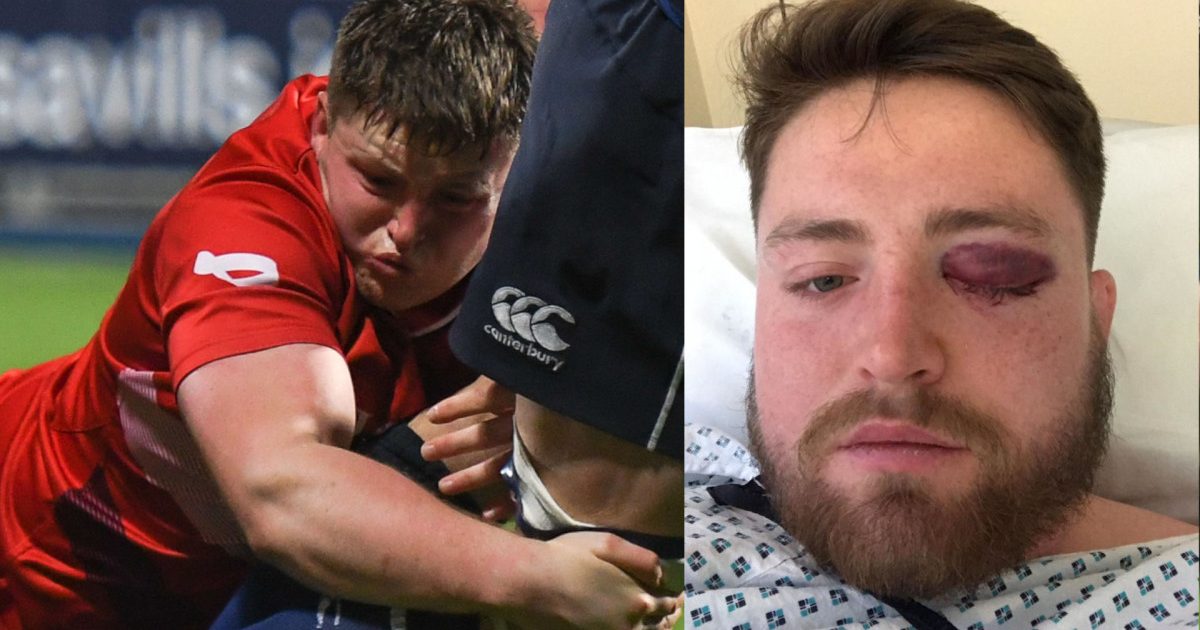Discarded: Why Jack Cosgrove feels betrayed after a life-changing injury cost him career

Jack Cosgrove can remember sitting on a log in Pontcanna Fields, rain stinging his cheeks as he wondered whether to go home to a life of despair and worthlessness, or to end things there and then in the Cardiff park.
At his lowest, the former prop felt hollow. Devoid of purpose at 25 years old, with a wounded left eye that no longer saw and flitted out of sync with its functioning counterpart.
The training-ground injury that claimed his sight, his rugby career, identity and purpose, altered his appearance and laid waste to his professional prospects would inflict mental scars that only now, nearly two years on, are beginning to heal.
That day, in the Welsh drizzle, he thought seriously about taking his own life.
“I did think then, this isn’t worth it anymore,” Cosgrove tells RugbyPass. “I felt at my lowest. I was really, really struggling.
“When you’re in that mindset, it is bloody horrible. It was the nature of the injury, the lack of support and disregard for me, the lack of care, it all built up.
“And then I thought, if I do something here, my parents, my girlfriend, my family will never, ever be able to overcome it. They’d never forgive themselves. I can’t do that to them.
“Without their support, and this is something I really want to stress, things could have been very different for me.”
Much of Cosgrove’s story is harrowing. Some of it is shameful. He is telling it now because, thankfully, he has found happiness again, a new purpose, and a fulfilling pathway to better times.
At its core, though, this tale is about love. Love for family; love for mates. Love for the dogs that helped pull him from the emotional quicksand of depression. Love for the players who toil unheralded in an increasingly ruthless sport. Love even for the game that took his vision and so much more besides. Love – that which can conquer this most heinous suffering.
It was October 2019, four months after joining the Dragons, that the accident happened. Every little detail, each plot point on the timeline of catastrophe, remains etched in his memory.
The clash occurred near the end of a long and gruelling session for his sixth professional club. Cosgrove and a team-mate converged to make a double-tackle; the ball-carrier’s arm shot over the top and his finger thrust into Cosgrove’s left eyeball. Doctors would later describe the collision as a one-in-a-million tragedy.
Blood gushed from the socket like a river in spate. The eye immediately began to swell shut in a grotesque rouge pulp.
“I remember it like it was yesterday,” the Scotland Under-20 international says. “I can literally remember everything.
“I walked off, spoke to the physio, and he told me to see the club doctor, who was in Cardiff. I then drove myself from training in the valleys to Cardiff, which was absolutely crazy. I couldn’t see out of the left eye, and my right eye was closing up too as I was driving. That’s something I’ve struggled with as well because, God forbid if anything happened to anyone, you wouldn’t be able to forgive yourself.
“The club doctor said he couldn’t really see anything and to come back tomorrow or go down to A&E. I wanted to go to A&E to get it checked, so I then drove again to get to the hospital, and by then, I was really struggling to keep my good eye open. It was very dangerous.
“The nurse looked at my eye and went to get another woman. All this woman said was ‘yes’. All of a sudden, we’re walking over to the eye department at such a pace that I’m almost having to jog to keep up. The consultant on call looked at my eye and said they needed to take me into emergency theatre.
“I was like, ‘To save my sight?’
“‘No, to save the eye’.”
For over five hours, surgeons operated on Cosgrove’s eye. The long gash ran down and across the organ, “from one o’clock on the clock face to nine o’clock”. The damage was extraordinary.
“There was so much blood pouring out, they were literally cleaning it away, trying to put a stitch in, cleaning blood away, trying to put a stitch in,” he says.
“My eye was a mess. A complete mess. It was worse than they’d anticipated but they kept going. People say it’s their jobs, but they went above and beyond for me when they could easily have stopped, and for that, I’ll always be in their debt.
“It wasn’t until the next day when we saw the consultant that he said my eye was really badly damaged and I was lucky to still have it, and it might have to be removed in future.
“I saw him at 9am; the incident had happened at 11am the previous day. To just think, bloody hell, this is mental, less than 24 hours ago I was going to training and everything was normal.”
The sheer speed at which these horrors unfolded made comprehension difficult and acceptance nigh-impossible. For several days, Cosgrove steadfastly refused to concede that his career was over.
“I told the consultant, ‘I will get back playing rugby – I will get back playing’. They knew I wasn’t going to get back, I just hadn’t taken it in.
“I was in denial for a long time. I thought I was going to get better.”
Gradually, he realised he was now a former player. In these bleak moments, he yearned for support, he longed to know that people were by his side and that he was not tackling this horrific ordeal alone.
The Dragons paid the remaining eighteen months of his contract in full, when legally, they could have cut it far sooner. They arranged counselling, too, when it was requested by Cosgrove’s mother. What they did not do, he says, was pick up the phone and ask how he was, or check whether he needed their help in some way.
?RETIREMENT | @dragonsrugby can today confirm that prop Jack Cosgrove has retired from professional rugby on medical grounds with immediate effect ?
?? https://t.co/iLj4N1aaJn#BringYourFire? pic.twitter.com/qx5Blb3NAP
— Dragons RFC (@dragonsrugby) December 5, 2019
Perhaps the staff and coaches were ill-equipped to deal with a player so stricken; perhaps they were simply swept up in rugby’s all-consuming churn. Their door may have been open, but for a person stuck in the depths of depression to the point of suicidal thoughts, walking through it is exceedingly tough. Cosgrove was left feeling like a spent round.
“You feel that you’re discarded, chucked on the scrapheap. You’re yesterday’s news. No disrespect, but I hadn’t just done my knee, shoulder or ankle – I’d had a life-changing injury.
“I didn’t feel comfortable going to them when I was in that hole, trying to get out, and you can’t see a way out. I needed them to check on me, not the other way around. I wanted them to come to me.
“At the time, I felt betrayed. I’d just moved to Cardiff; I was there with my partner but I hadn’t built a friendship group yet. They didn’t help me get to the doctors – they didn’t even ask if I needed help.
“I was going three times a week to make sure there was no infection in my eye because of the damage.
“They didn’t know what my support network was like. They didn’t know that my partner, mum and dad would never miss an appointment. They didn’t realise that my parents would drive two-and-a-half hours from Coventry to take me to the doctors and then drive home again, because I couldn’t drive myself.
“They didn’t know my parents would do overtime on the weekend so they’d be able to miss work to take me.
“It was a downward spiral from there because you feel worthless, you are just forgotten about. I did find that really, really tough. It was an unknown for the Dragons, but I want them to take learnings from my experience and have more in place to help.”
When contacted for comment by RugbyPass, the Dragons said they “take player welfare and mental health very seriously and strive to offer the best possible support to any player.
They added: “We acknowledge Jack’s comments and are determined to learn from his experience.
“Everyone at the Dragons wishes Jack every success in his future as he continues to make the transition from playing.”
For a ravenous trainer who poured everything he had into rugby, their lack of proactive support was a sickening blow. Cosgrove didn’t attend his last-ever day of high school because he had training at Worcester Warriors. He overcame ankle damage and a particularly serious foot injury at Bristol Bears that threatened to put him out of the game.
We talk often in rugby of cherished ‘values’. We get snooty when we tout the special ethos of our sport. But speak to many elite players, and you will find that rhetoric to be an edifice. There are fine coaches and caring clubs, of course, but the game is taking an increasingly utilitarian view of its people.
“My story blows your mind when you really think about it,” Cosgrove says. “You don’t even need to be a first-aider to know that if anyone has got an eye injury, you don’t let them drive themselves.
“We all like to say that this is culture, friendship, brotherhood – they are great buzzwords around changing rooms. Loyalty is one: ‘you put your body on the line and we’ll look after you’. There are lads, myself included, who have been absolutely knackered from a weekend game and been told by a club, ‘We need you to train today’. You train, but then when it’s the other way around and you need them, they’re not there.
“We need to see rugby for what it is. It is a business now. That’s fine, but let’s not sprinkle it with stardust. It is a business and it’s about winning. Let’s not make out that it’s all about being a good bloke, because that’s rubbish. It’s nothing to do with that at all.
“If you have good people at the top of environments, you have good environments. I’ve been in those, especially at Bristol under Pat Lam, which is how I know that in other environments, it’s all window dressing, it’s just for show… ‘Look at us, we’re good guys, doing this for our players’.”

Cosgrove’s partner, Claudia, suggested the couple buy a puppy to keep her fully grown dog and her struggling boyfriend company. The responsibility forced him to function on days when he would otherwise have hidden beneath his duvet.
“There were days where I wasn’t eating, but the dogs were. It sounds terrible, but not getting out of bed, not brushing your teeth, not wanting to shower, not wanting to do anything.
“Every day, I knew I had to take my partner’s dog out because it was my duty. Then she said we should get a puppy, and she was a handful. I couldn’t just lie in bed because she’d chew the carpets and the sofa, she’s this little ball of white fluff and you can’t get angry at her.
“It sounds silly, but I knew I had to get up and take them for a walk. Then I was getting out for an hour of exercise a day, it started to make me feel better so I was tidying up the house, making dinners.”
Counselling helped immeasurably too, once Cosgrove had shed the macho predisposition to conceal his feelings. John Andress, his agent and himself a former prop, was a fabulous ally, as was Barry Cawte of the Welsh Rugby Players Association.
“Barry and John were huge. They helped get a grip on stuff. Barry was disgusted with what had happened, and it felt like I had another person on board, an outsider who wasn’t an agent or family. I spoke to a number of people and everyone had said they couldn’t believe the lack of treatment I’d received.”
When he got down to exploring new careers, Cosgrove found the options had shrivelled due to the scope of his injury. He is now classed as partially disabled. He had long been interested in joining the fire service, but unsurprisingly, that was off the table.

Instead, he wants to use his experiences in rugby to help those mired in its daily rigours – not as a coach, but an advocate, a confidant who has been through it all and can guide a troubled player towards the light.
“The treatment players receive, I don’t believe is good enough,” he says. “I’ve known that first-hand. If you are struggling, injured or not being selected, it feels like the world has ended because it’s your be-all and end-all.
“Psychologists come in for the Six Nations for a few weeks and talk about playing under the highest pressure, representing your country to the really top-end players. But what about the guy on a low-end wage who is out of contract with a mortgage and two kids? There is a hell of a lot underneath the top who need that support.
“Almost all professional players live very normal lives. It’s nothing like Premier League football money; they aren’t rolling around in Bentleys and Lamborghinis and they can’t live off what they earn in rugby. Playing-wise, it’s a short career, and you need a whole new career once you retire.”
Despite all of the turmoil, he does not hate the game, but he knows it needs to change. He says he would do it all again if offered the chance to relive his career. Should he and Claudia become parents, he would be happy for his children to play too.
Cosgrove is currently training to become an agent with Andress’ Edge Rugby Management, a brilliant opportunity he is determined to seize. He recently became a trustee for Second Half, the charity arm of the WRPA which helps players in ‘times of hardship’. He is coaching his local side, Barker Butts RFC, and loves the purity and joy of the grassroots game. And several weeks ago, he proposed to Claudia. The pair have set a wedding date in June 2022. The dark clouds are shifting and Cosgrove is emerging from the gloom motivated and content.
“I’ve got another goal, another aim, daily things I need to tick off, which is massive for me having always been in a structured environment.
“We’ve got a lot of stuff to look forward to. I really do feel that I can close that last chapter of my life. I won’t shy away from it. I will never forget it, but I can’t let it consume me for the rest of my life. I am lucky, I do feel very lucky, and it’s about making the most of every day. It’s been a blessing to have this role come along.”

He is speaking out partly through the compulsion to aid other young men. To show them that fronting up to emotion is not weak or improper. And of course, he still grapples with many things, most frequently and viscerally with the way that he looks. The stares at the supermarket, the unvarnished glare of a webcam on a conference call, the inner repulsion that sometimes grips him when he catches sight of his reflection at the gym.
“You glance in the mirror and think, bloody hell, look at my eye. I’m not stupid, it looks bad and people do stare, especially now with masks when all you can see are eyes.
“It’s black, it’s blue, it’s turned-in, it’s all over the place. You just think, Jesus, I’ve lost my career, but it’s changed the way I look, it’s had so many knock-on effects.
“You know when you look at me that I’ve got a blind eye. There’s no getting around that. Up until recently, I was still very conscious of it.”
When Cosgrove looks in the mirror, he sees the trauma of his past. In reality, staring back at him is a future filled with promise, love, and the power to do good for those who follow.



















